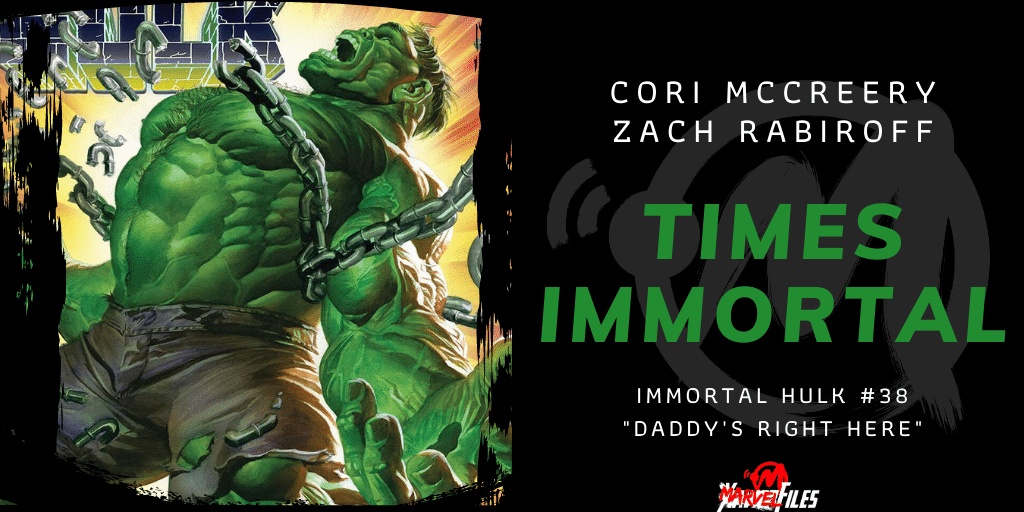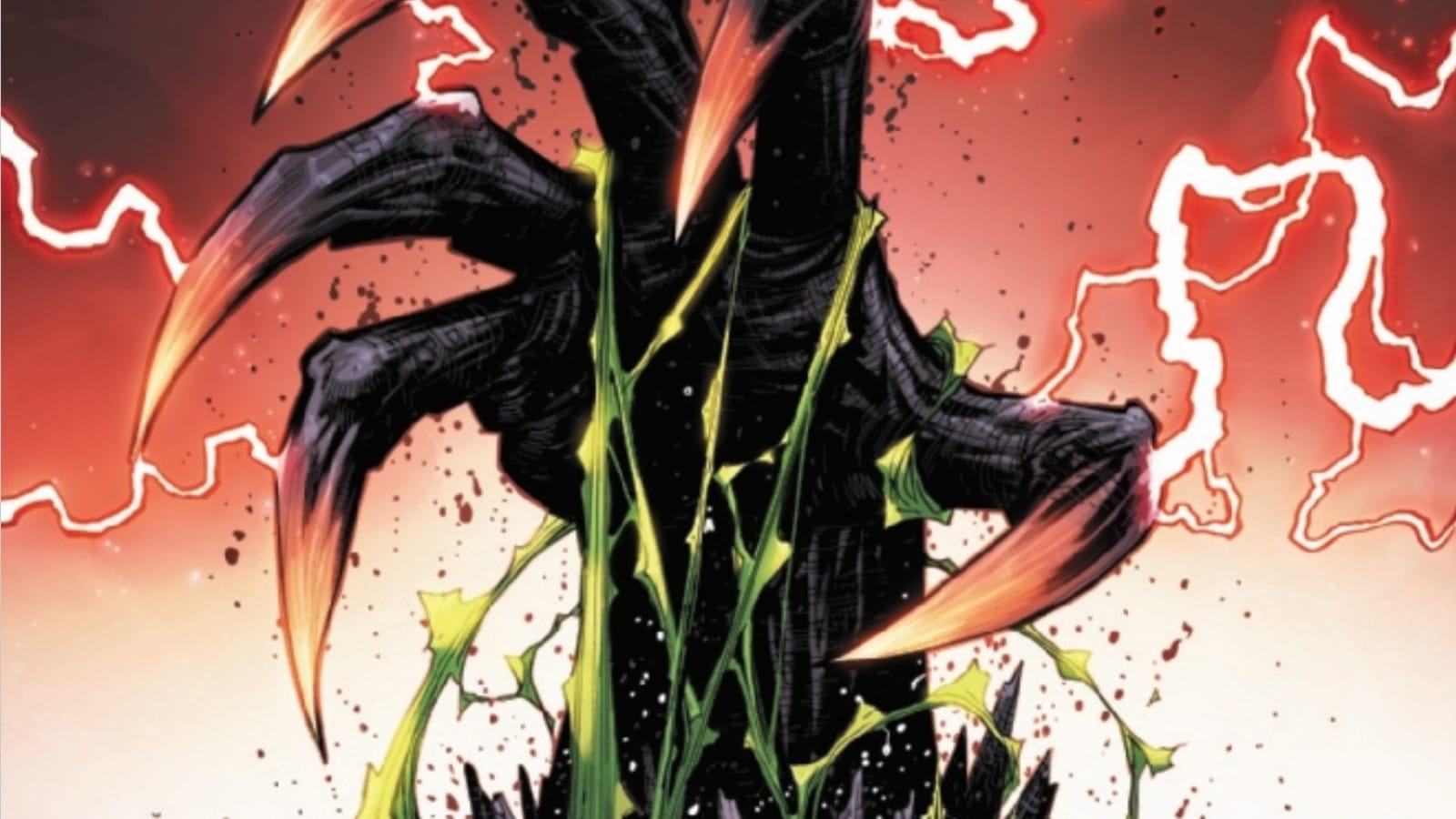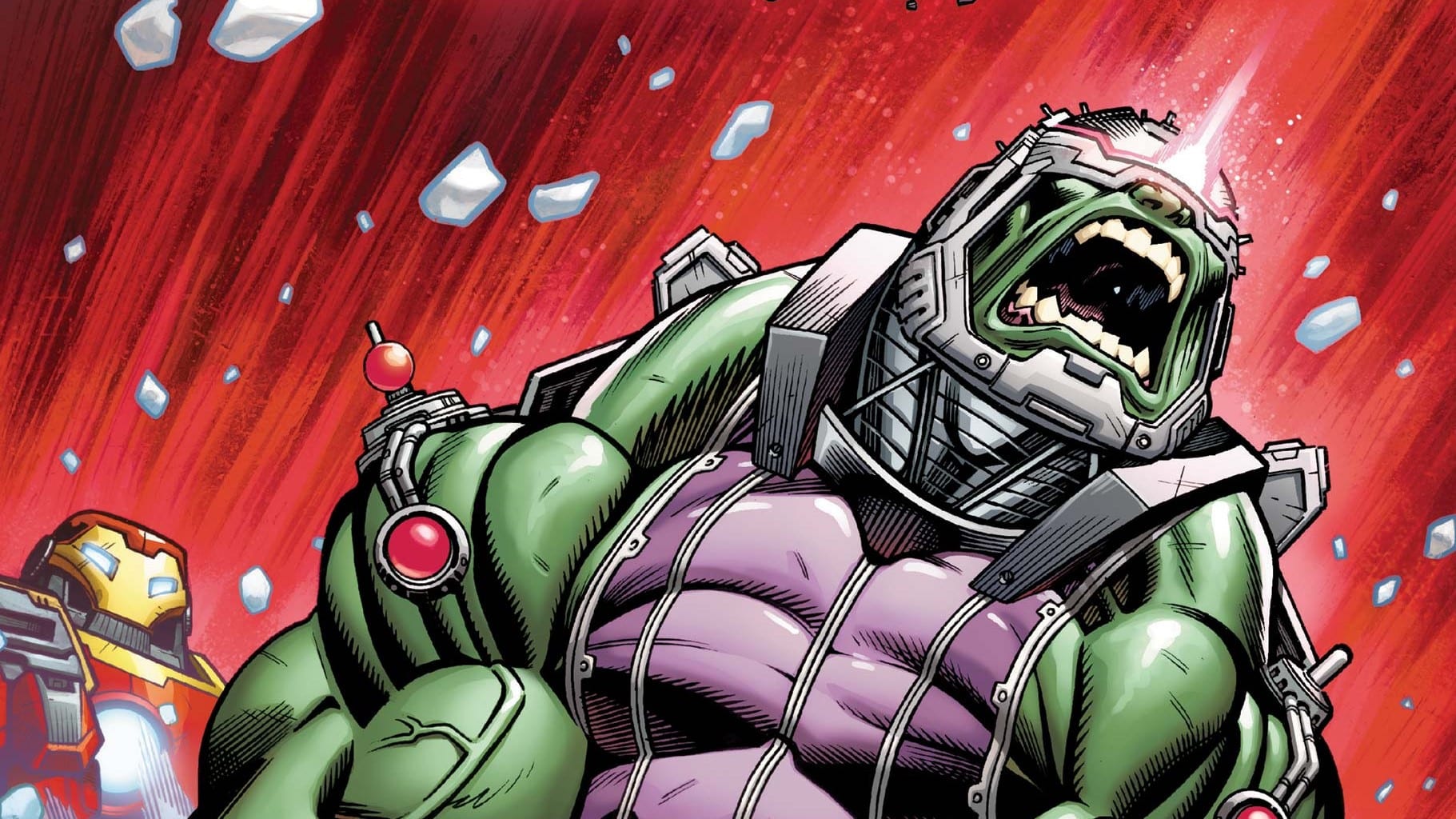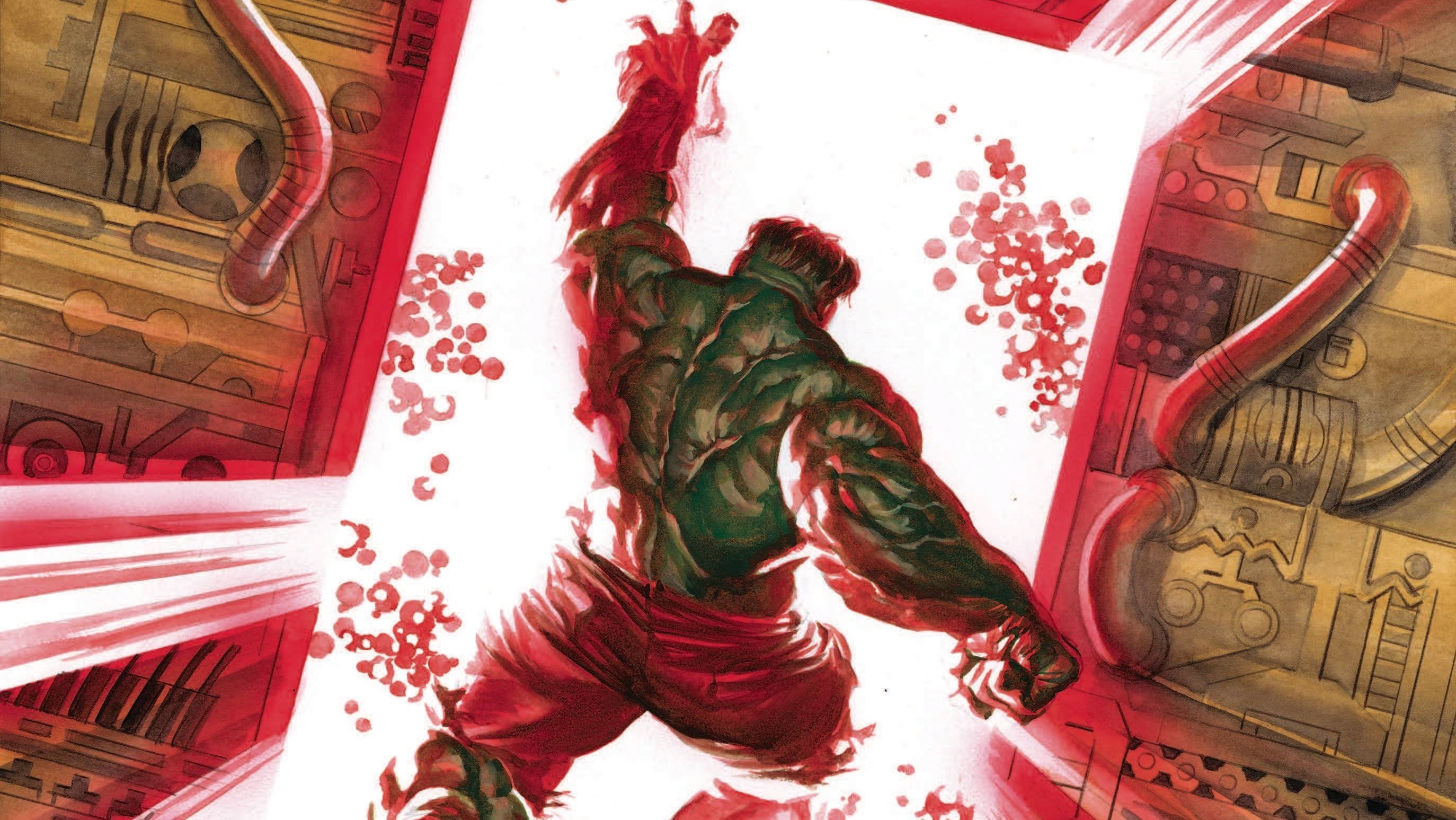The whole crew seeks to fight against the Leader, in the Hulk’s mind, and in several actual bodies, in this banger of an issue written by Al Ewing, pencilled by Joe Bennett, inked by Ruy José, colored by Paul Mounts, and lettered by VC’s Cory Petit!
Robert Secundus Zach Rabiroff: [The stage is silent. A diffident figure steps into a lonely spotlight. He taps the mic gingerly, producing a screech of feedback that alarms both him and the increasingly uncomfortable crowd.] Um. Hi, there. You’re probably wondering what happened to regularly-scheduled co-writer Robert Secundus this month. Well, kids, remember back in the glory days of comics, when deadlines caused creators to get shuffled around, and every so often you’d pick up an issue of your favorite series, only to discover it was some inventory fill-in written by Terry Kavanaugh? Well, uh, just consider me your Terry Kavanaugh.
Yes, Robert is taking a short break while he focuses on the big X-Men crossover now in progress. And while I’m sorry to see him go, and terrified to be filling his shoes, it’s a genuine delight to be here alongside the great Cori McCreery as we talk about the latest in the ongoing wonderful horror that is Immortal Hulk. Hi, Cori!
Cori McCreery: Zach, you do yourself a disservice by comparing yourself to Terry Kavanaugh. You are a FOUNDER of this column. This is like Jack Kirby coming back. Only I promise to treat you better than Marvel did to him. Really excited to get the chance to discuss Immortal Hulk with you, since I’ve already had the chance to do so with Robert.
ZR: You’re far too kind to compare me to Jack Kirby. Let’s just call me Chris Claremont making a dubious return to X-Men in 1999. It’s Revolution time, folks!
Immortal Hulks and Immortal Hates
ZR: This issue’s opening quote returns us to the Miltonic themes that have been a kind of leitmotif throughout this series with a quote straight from Milton’s Paradise Lost (specifically, Book I, for those with their Norton Critical Editions open at home):
What though the field be lost?
All is not lost; the unconquerable will,
And study of revenge, immortal hate,
And courage never to submit or yield,
And what is else not to be overcome?
It’s a telling quote for a number of reasons, not least of which is that little nugget about “immortal hate.” One of the quiet, never-quite-asked questions in this series has been: why is the Hulk immortal? Why does he (and, for that matter, those who share Banner’s Hulk-ness), of all beings, transcend the limitations of death time and again? Milton’s passage, written from the perspective of the fallen Lucifer, offers a disturbing possibility: it is hate, relentless and unstoppable, that brings on eternal life. Milton sets up Satan’s immortality as a kind of perversion of the immortality offered through faith in God: not through love, but through the power of pure and unrelenting hatred and spite is he driven to resist oblivion. So, is that what Banner is – a force of destruction wreaking vengeance without end? Or do you think we’re meant to read this a different way?
CM: See this is why I like working with you and Robert. You guys are smart about the religious stuff, where I’m a clueless dumbo. I think you’re spot on with this, especially since the main star of the book has been a devil analogue this whole time. I think the various Hulks are all parts of Bruce’s psyche that want some form of vengeance, only the Devil Hulk’s is less subtle than the rest. Devil Hulk is an avatar of vengeance for the world, while the others are much more specific. And I think it’s interesting to think about the other people pulled into immortality, because it hearkens to the corrupting influence of the devil to bring others down to him. They’ve all been touched by Banner’s sin, and thus are tied to it forever more.
ZR: That’s such an interesting thought, going back to the idea thrown around early on in this series that the Hulk operates somewhat like a virus, with the potential to spread unchecked. On a story level, that’s likely a result of the Leader’s plot for control. But thematically, you’re right that it dovetails really well with the idea of Satan, who exerts control through corruption and seduction rather than brute force.
That said, I do think there’s an alternate reading here, suggested if we go a few lines further in Milton’s poem, where Satan pledges to find some way to continue waging eternal war against God, who “now triumphs, and in th’excess of joy / Sole reigning holds the tyranny of heaven.” The point being that the Devil – even though he is, you know, the Devil, and even though his entire M.O. is to bring deceit, hopelessness, and suffering to the world – might actually be acting in the service of something weirdly admirable. Heaven is joyful and perfect, but he’s not wrong when he calls it a tyranny. It makes me think of the famous line from William Blake (another fella we’ve seen quoted in these issues) that Milton was “of the Devil’s party without knowing it.” The Devil might not be the hero of his story, but he might not be the villain, exactly, either. And that’s something important to keep in mind, given that the rest of this issue makes very clear that the Devil in Mr. Hulk plays a very big role indeed.
CM: One thing I often think about is, what is the point of Heaven without Hell? If there’s no alternative, it doesn’t seem like much of a reward for being good. I like depictions of the devil that play with that, that he’s not truly this diabolical villain, but he’s just another person fulfilling a role that God needed filled. And I think that that ties pretty well into how the Hulk’s Devil fits in too.
Devils and Daddies
ZR: I’m not even kidding when I say that the Secret Origin of the Devil Hulk was a moment in this comic book that literally made me clap my hands with glee (this says more about me than I should probably be revealing, but so be it). All through this series, we’ve seen the Devil Hulk as an underlying, violent, but consistently protective force among Banner’s alters, and I’ve always presumed the name to be something of a colorful, apropos metaphor. But no: the Devil persona is Banner’s recreation of an actual illustration of Milton’s Satan from his childhood copy of Paradise Lost. It’s a fantastically clever move that somehow totally recontextualizes what the Devil Hulk means in the context of the Hulk’s personality: he isn’t just protecting him from harm, he’s also standing up against all the bullying, violent forces of authority who claim to be protecting Banner even as they hurt him. It doesn’t matter whether it’s Milton’s God (“God, therefore, cannot hurt ye and be just”), or the drunk, abusive Brian Banner (“A dad can’t hurt you and be a good dad”), or the pseudo-benevolent patriarchs of the Roxxon corporation. The Devil Hulk – and by implication the actual Devil! — is the whole reason that Hulk is an antiauthoritarian force, and it all starts right here in this flashback.
CM: God that flashback was so intense! I, like Brian, feel very stupid next to a three-year-old reading Milton, but unlike Brian, I would not get drunk and violent about it, so that makes me better I think. I think Bennett does an absolutely fantastic job during the flashback scene of showing us just how dangerous and monstrous Brian is. The “Yes, he’s learning the little m-monster” panel is horrifying. God, I can’t get those eyes and that mouth out of my head. Gonna have nightmares for a week.
ZR: Yes! I love the expressive work that Bennett does with those wild, crazed eyes – which are something of a motif in this series, come to think of it. Brian’s red-tinted eyes are echoed over and over again in the form of the Devil Hulk, playing up that creation’s existence as a kind of quasi-benevolent reflection of the monster that created him. And those are transformed into the glowing green eyes that indicate the Hulk’s perpetual rebirth. It’s so perfectly color-coded, it would make my 11th-grade English teacher planning his unit on The Great Gatsby blush.
Among other things, I also think this is an example of a really great retcon – a term that tends to get a pretty bad rap for pretty good reason. But the flashback that opens this issue actually takes place smack in the middle of a scene we’ve seen once before: way back in 1985’s Incredible Hulk #312, the issue that first introduced the notion that the Hulk was actually a psychological product of Bruce’s childhood trauma. But the presence of the Milton book, and little Bruce’s subsequent use of it to emotionally protect himself from abuse, is all new, and it adds to the original story in a way that both builds on everything we’ve seen in Immortal Hulk and also adds unexpected depth to the whole Hulk saga from the beginning. It doesn’t overwrite or contradict anything we’ve seen before, but it makes us think about it in a totally different way just by adding in one new element. In essence, that Milton book becomes Bruce Banner’s Rosebud – a key to his childhood that somehow explains everything in a way that’s hard to entirely sum up. It’s what our friend Jonathan Hickman might call additive, rather than subtractive, comic writing, and more would-be retconners could stand to learn a thing or two from it.
I’ll Always Be Here For You
CM: Speaking of Hulks and their perpetual rebirths, sure looks like the Leader might have done and gunked up, here, huh? It feels like this issue showed us that he has stretched himself a bit thin while controlling so many different people. He’s got Del and Rick out in the real world, while he’s pulling the Big Guy through the Inner World, and still tormenting Samson in the Below-Place. What do you think about this narrative of Leader overextending himself and how it plays out through the issue?
ZR: It’s very much on-brand for Samuel Sterns to ever-so-slightly overestimate his own intellect in planning these elaborate capers. In this case, his fatal flaw seems to be both overextension – as you point out, that’s an awful lot of moving pieces he put on the board here – and an assumption that the pawns in his game would ultimately go along with his plan for lack of a better option. Ewing has really cleverly, I think, emphasized the “Leader” aspect of this villain’s identity: he’s the fascistic counterpoint to the personal freedom of thought and identity represented by the Hulk. And his failure to realize that the heroes of this story will ultimately choose the Hulk’s side over his is the most quietly affirming moment of this issue.
CM: Samson braining the smarmy bastard with a piece of rebar and concrete was just really really satisfying. Coupled with Dr. McGowan ripping Rick in half, it’s just nice to see him lose the upper hand for the moment. This is the rare occasion where our end of issue cliffhanger is more hopeful than distressing, so I’m excited to see how Ewing is going to pull the rug out from under us.
ZR: It manages to be hopeful and disquieting at the same time, which is kind of the sensation I’ve come to associate with this series. All things considered, though, this was really quite an issue. It feels like the various threads introduced since the start of the run are starting to come together, and the story is picking up a kind of frantic momentum as it hurtles toward something unknown. Which is interesting, considering that even though we’re approaching the endgame, we still have a good dozen issues to go before we get there – ample time for a final swerve or two. I don’t quite know where we’re going from here (and I’ve learned well enough not to try and outgame whatever Ewing has planned), but given that Bruce has just been hurled through the Green Door behind which lies the paternal source of all his trauma, anger, and perhaps even immortality…I think I have at least some idea what’s coming next. Your closing thoughts, Cori?
CM: This series certainly keeps me on my toes at all times, and remains one of the best things I read every month. Our talk this month made me think about my friend who legitimately loves Paradise Lost so I reached out to her to tell her to read this. Hopefully she digs it, because I certainly do.
Marvelous Musings
- Am I going to make nefarious use out of the two panels of Hulk saying Daddy? Yes, of course I am.
- Since this issue’s Milton quote was plucked out of young Bruce’s childhood library, I’m now wondering if all the issue-opening epigrams are supposed to be read in voiceover from three-year-old Bruce Banner, mutant Wonder Years-style.
- Is three-year-old Bruce played by Fred Savage?
- Oh, this is good. Call us, Disney+.
- One thing that’s refreshing to me is the thing that brought me into the series: Dr. McGowan is a trans character, but she’s never just that. Since I started covering the book it’s not been mentioned at all, she’s just there doing her job, and I really appreciate that.







